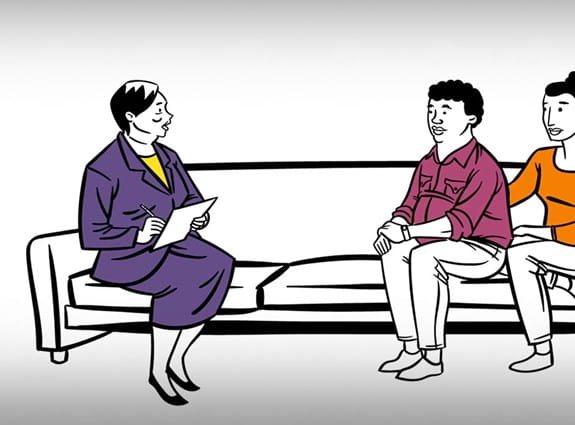Social workers can help you cope
Narrator: Having cancer affects every part of your life. After my diagnosis, I had so many questions and worries, and didn't know where to turn. My doctor suggested I speak with a social worker.
[The narrator sits at his kitchen table. He looks a bit worried. A thought bubble appears at the top-left of the screen. In it, the narrator is hugging his wife and child. Another thought bubble appears at the top-right of the screen. In it, the narrator is lying in a hospital bed. Then question marks appear above the narrator’s head. The scene ends.]
Narrator: I learned that a social worker is an important part of my healthcare team and could help me and my family cope.
[The narrator’s healthcare team appears on screen. There are 2 doctors in lab coats, a nurse in scrubs and a social worker in a suit. As the narrator speaks, the focus shifts to the social worker and the rest of the healthcare team fades out. The scene ends.]
Narrator: When I struggled with how to tell my family and friends about the cancer, she suggested ways to share this news with everyone.
[The narrator is sitting at his kitchen table. He looks sad and lonely. Then his wife and child are with him. His wife has one arm around his shoulders and is holding his hand. His child is hugging him. The narrator looks happier and relieved. The scene ends.]
Narrator: I didn't know what to expect when I started treatment. My social worker helped me make a list of questions to ask my doctor so I could get the answers I needed to feel better.
[A notepad and pen appear on screen. As the narrator speaks, the pen scribbles notes on the pad. The scene ends.]
Narrator: I wasn't the only one who found it hard to cope. My wife did, too. The social worker taught both of us how to manage our stress better.
[The narrator is sitting on a couch facing his social worker. The social worker is holding a pen and paper. Then the narrator’s wife appears next to him. They both look attentive and interested in what the social worker is saying. The scene ends.]
Narrator: She also recommended a support group for me so I could connect with people who knew what I was going through.
[The narrator is in a support group meeting. The group members are sitting on chairs, listening to one person speak. They look interested and engaged. The scene ends.]
Narrator: She helped with practical matters, too. I didn't know how I would get to the hospital for treatment every week. She referred me to a local volunteer program that offered rides.
[The narrator is getting into a car outside of his house. Then the car drives toward a hospital. The narrator gets out of the car at the hospital and waves goodbye to his driver. The scene ends.]
Narrator: I also worried about money because I had to be off work for a long time. My social worker showed me how to apply for financial help.
[The narrator is sitting in his social worker’s office. His notepad with questions and other papers are on the desk between them. His social worker is giving him papers from a file folder. The scene ends.]
[Narrator: After finishing treatment, there were still challenges. My social worker helped me cope with changes to relationships and going back to work.
[The narrator walks onto a construction site holding his lunchbox. Several of the narrator’s co-workers appear and greet him. They look happy to see him. The scene ends.]
Narrator: Everyone copes with cancer differently. Just remember that you are not alone. Like me, you may find that a social worker can be a big help.
[The narrator is sitting on a couch facing his social worker. They are talking to each other. The scene ends.]
Narrator: The Canadian Cancer Society can also help you. Visit cancer.ca or call 1-888-939-3333.
[The Canadian Cancer Society’s name, logo, phone number and website appear on the left side of the screen. The Bank of Montreal (BMO) logo appears on the right as a proud sponsor of the Cancer Basics video series.]

